
Circuit Training 46: The Fall and Rise of Richard Herring

It's a freezing Friday evening in my home town - well, the next town along, but let's not split hairs - and an ever-growing group of surprisingly well-turned-out folk are hovering expectantly. It's not easy persuading discerning punters out of their armchairs after sundown round here, but thankfully the newly renamed Hertford Theatre has enjoyed a radical revamp and is attracting some fine shows to this once culturally-barren county town. Tonight, it's Richard Herring.
But will he get a decent audience? A silly question given his regular sell-out Edinburgh runs, you'd think, but life's not so easy on the road. Indeed, it soon becomes apparent that this was even the case when Herring was a TV fixture, and it's easy to forget that the now polished stand-up only took to the circuit during a fallow period in the mid-naughties.
Herring is no stranger to this site, of course - elsewhere on BCG you can find his intriguing podcast, Me1 vs Me2 Snooker - and he's just about the perfect subject for Circuit Training's ongoing obsession with development hell. So we hunkered down in his dressing room shortly before several hundred locals showed up, one of whom, it later transpired, was his new fiancé's mum. No wonder he was in a reflective mood...
Part 1 - The Way Back
I didn't need to do much research for this interview - with all those blogs and podcasts we must know more about you than any other comic?
Yeah, probably too much? I wondered to begin with if it was a bad idea to blog. If you're in a bad mood it's hard not to reveal that. Or if you're miserable about something not getting commissioned, it's hard not to let your feelings come through. There's the element of destroying the mystery that puts people off a bit, but overall it's worked out really well. From creating these podcasts and blogs, that's what's created my live audience.
With Lee & Herring, no-one really came to see us. Even with my early tours, we were a big hit in Edinburgh, 150-seater venue, it got good reviews. When we toured it about 30 people came to see us.
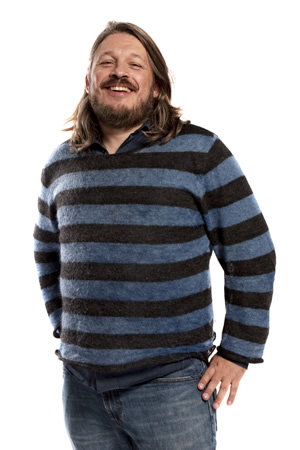
Really - you weren't selling places out?
Nah, with Lee & Herring it was like anyone who liked us was too young to be allowed out at night, so we had some 800-seaters that were full, but also thousand-seaters with a hundred people in them.
It seems odd, so soon after Baddiel & Newman were selling out Wembley Arena.
Maybe by association people thought we were a rip-off of them. We hadn't even seen them to be honest, we'd been working on our own stuff. Maybe we were a bit esoteric. I had to start again with what I was doing live and work out where I was going and what I was doing. So by doing the podcast stuff I helped keep the audience I already had and brought in new people.
I'll be interested to see what sort of audience you'll get for this particular gig...
With my show, there's early stuff that might make people bristle and go 'oh what have I come to see?' But actually it's quite a sweet and lyrical show and it's quite accessible. I've done Radio 4 shows in the last couple of years, they've brought people in. My slight worry with this show is that the [As It Occurs to Me] podcast people will come and say 'where's all the stuff about fucking cumpkins?'
Speaking of Radio 4, you wrote a very honest blog about Richard Herring's Objective being axed...
I assumed that was a shoo-in to be honest. We got much better [ratings] than the first series and everyone seemed to like it and I kind of thought 'oh that will definitely happen.' But obviously there's loads of competition and very limited slots and they want to bring in new people so you can't get upset about it. It was really hard to write it, so part of me was thinking 'do I put something into Radio 4 or do I do something myself?' If you do a radio show you will get paid a certain amount. But then if I do a show every Monday and it's sold out I'd probably make more money than I would from doing a radio show.
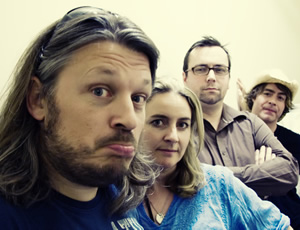
It shows how far you've come with podcasting, that you'd actively consider choosing it over a radio version.
That's what I like about AIOTM (pictured). People have asked do I want to do it on the radio and actually I don't, really. Even if someone offered it to me, I'd think about it and maybe do it but it paid for itself in the end. I've always thought that about the big TV stars, I wonder why they bother to do it through the BBC when they have the money to make it themselves and have complete artistic control and then sell it to the BBC. Or just put it out on video or the internet or whatever. So I think that's all exciting.
The nice thing about doing the podcasts is that you can do something stupid like the snooker thing which is very, very easy to put together and kind of crazy - although that might encourage people not to come and see my live shows! Ultimately I hope to do that as a live show if I can build up enough interest in it.
I remember my Metro days when interviews with you always seemed to have 'former TV star' in the intro...
It happens on Twitter, people thinking they're clever pointing that out to you. It shows a gap in their knowledge, that only things on TV are worthwhile, whereas if you like comedy you know that a lot of comedy that doesn't get on TV is better than some of the stuff that does.
There are times when I was and times when I wasn't fine about it. I'm very proud of everything I've done, Lee & Herring, the plays I wrote in Edinburgh never got any recognition. On The Hour was the only thing that got any plaudits but then we got nudged out of that. It feels like I've worked very hard and not got that recognition but then you get a bit older and you realise, well, the recognition isn't the big thing.
You seem to get a fair bit of respect nowadays, due to doing your own thing.
I'm in a lucky position where I'm autonomous, no-one's saying 'oh you'd better not do that Hitler show cause you're on the Abbey National adverts' or whatever. But there are times when it gets me down, times when you don't get a thing commissioned and it's upsetting and you think 'oh I'm going to give up.'
Generally speaking, though, are you fairly content where you are now?
I mean, I wanted to be the most famous comedian in the country and I wanted to be on the telly. When I was on the TV I wasn't interested in doing live stuff, but accidentally I've fallen into this almost peachy place where no-one really knows who I am in the streets. Once a week I might get a 'oh are you Richard Herring, I really like your stuff' which I can cope with. No-one's giving me any hassle.
But also enough people like me to keep me going, feasibly this audience will keep coming and keep bringing a friend every year and will keep growing. The worst thing to happen would be to get, well... Stew's going through it a little bit, he's now in this difficult position, he's complaining that people are copying his style, which you have to put up with I think.
There were an awful lot of Eddie Izzard-alike a few years back.
He [Lee] did it himself, he admitted he was very like Ted Chippington when he started and you can really see the parallels. It's a stupid argument but it's like you lose control of your image and of what you do. So being in this position where you keep working is not bad.
It's surprising to think that you only started on the circuit relatively recently...
I had a couple of years around the time that I started the blog that I was just trying to work out where I was going. I realised getting back into stand-up after doing the Hercules show [at the 2004 Fringe] was the big thing, I always resisted because I didn't think I liked doing, or could do it, and I was scared of it. And so I kind of shied away from it.
So making that decision to go back to that gave me the outlet to perform, which was all I really needed, which got me out of the house and stopped me skulking around really miserable. I drove around the country doing all these gigs and I worked really hard. And that was six or seven years ago I guess. I've been working really hard since then. Both me and Stew worked really hard when we were together and have done separately.
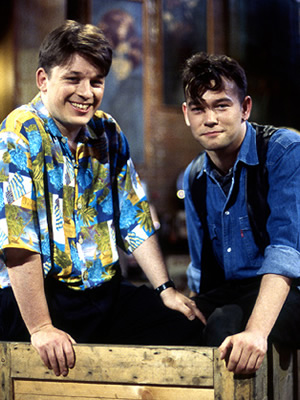
It must have been hard on the ego, being famous and starting back at square one?
Well I thought 'no-one's going to come to me so I've got to get out there.' I think with Stew coming through and doing really well as well, it was weird as I was just starting stand-up. Some journalists saying 'he's very derivative of Stewart Lee' and you're kind of going, 'well, we worked together for 15 years so there's a chance we influenced each other.'
People would just insist that I'd copied something off him, and I'd go well, actually I came up with that first, or you know we came up with that independently because we worked together for 15 years. The thought processes are the same.
Those comparisons must have been annoying though...
He was the best comedian in the country at that point and I was just starting stand-up again so it wasn't like a fair comparison, he was always going to be the better comedian out of us. Having that to aim for and constantly being compared to the best comedian in the country does mean you could just go 'oh I give in,' or I've got to push myself and try harder.
People expected me to be bitter and upset about it, you know, you have your moments where you do go 'oh that's unfair', but I think as a comedian you can only be glad that someone like Stewart gets a TV show - two series - because it shows you can get something on TV that you want to do.
It shows the benefits of throwing everything into stand up, rather than just thinking telly.
It was almost in reverse for me. Most people who do the stand-up, they do it to get onto TV. Actually you can only become a good stand-up by doing ten years of it, it comes organically. I think now I'm a really good stand-up. My live shows are kind of top notch I think, because I know what I'm doing. But if you get snapped up straight away you never get that time to learn.
So yeah, I was really lucky to be able to go back out on the road and take any gig I could. I remember the first open spots I'd done where it was [usually] really difficult to get a gig I'd email thinking, 'umm, I don't know if you'd give me an open spot?' and they'd be like 'of course we'll give you a spot, you're Richard Herring', so it was that little leg up, but also I wasn't so massive that it felt ridiculous.
It's nice to be in this position. It's like Arthur Smith talks about being mildly famous as the best kind of famous. You get all the perks with none of the shit.
Part 2 - Frames, Rows and the Road Ahead
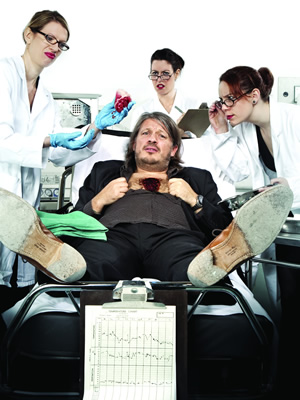
Is the message as important as the laughs for you these days?
I've always been into comedy and I like the idea of making people laugh, but I think you can ask interesting questions and make people think about stuff. Comedy is about surprise and it's about surprising people with an idea - I never liked jokes, I liked characters and concepts and illogical arguments and taking something as far as you could possibly take it and annoying people on purpose. I was always interested in experimenting within the boundaries of comedy but I also think you come to the point where you have to be funny as well.
Could you see yourself writing serious scripts eventually?
I'd like it to be funny but this show [What is Love Anyway?] is a good example, there's a mixture of funny stuff and humiliating stuff. And then quite moving stuff and quite serious stuff. The last routine in this show is about my grandmother having Alzheimer's disease which goes from making people laugh to making people nearly cry - and then to make them laugh again within two or three minutes.
I think something like that where you're really playing around with the theatre of it and the emotions of it, for a comedian that's really exciting I think, to be manipulating an audience without it being manipulative, to be able to make them feel things. It's about theatre, it's about life and I think live comedy is especially about just creating something in the room in that moment.
Does all your stuff have that ethos now?
I've never wanted to be just frivolously joking, sometimes I like stuff that's silly and pointless. That snooker podcast I think is one of the best things I've ever done [laughs], it's completely improvised and not over planned, but it has so many overriding themes to it and it resonates. We all feel like we're competing against ourselves, we all feel like we're losing our minds.
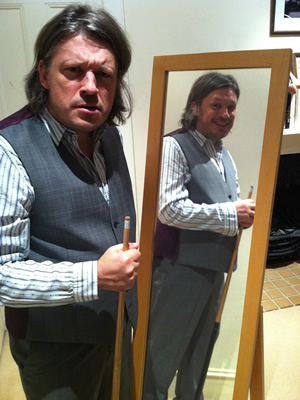
It's certainly not a 'put this on the radio' type of podcast.
When I did it on Twitter people just really got into it, so I thought there was something in this, something that would never be on TV. I can't imagine any TV station would take it - well, maybe some satellite thing might do [laughs]. I really understood the possibilities of it, comedically and playing it straight as well.
It's like a Beckett thing, the longer it goes on the better and worse it becomes. I don't know what's going to happen. I mean there are a couple of things I could do to change it, but it's kind of better when something just happens, like my girlfriend phoned up and that's completely not set up. I've just got to be completely in it and not worry about trying to put jokes into it or making it funny. And enough funny things will happen. It's just odd.
So that's going to evolve as it continues?
It's stupid and it's frivolous but it has this real sort of serious undercurrent about the nature of being a human being. If only 50 people in the world come and go 'this is amazing' and everyone else goes 'this is stupid' then it doesn't matter does it? You have to choose to download it. I love when people get angry about these things.
Speaking of people getting angry - how do you look back on that Twitter row with Ricky Gervais' acolytes, over his use of the word 'mong'?
It was weird, me just saying 'we should be nice to disabled people' is the most controversial thing I've ever done! I wasn't even really offended, I just thought it wasn't very funny. You know, Jerry Sadowitz used all those words and I think it's fine when he does it because I think it makes sense in what he's doing. So it's not like I'm saying you can't say the words. Like I did a whole thing in Hitler Moustache about using the word 'Paki', used the word over and over again. It's about the meaning of the word, there's an interesting discussion to be had about the meanings of words.
But what Ricky Gervais was doing wasn't a good example and was really pathetically put together. I just thought what he's doing isn't funny and is perpetuating this idea you can use disablist language. That debate about what is offensive comedy and whether we have the right to be offended, obviously comedians aren't allowed to do whatever they want and there is a line where something is too offensive to be comedy.
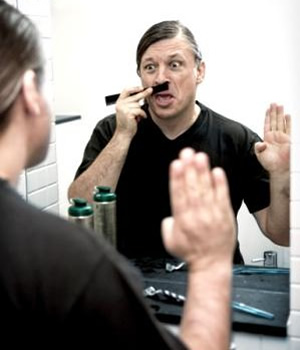
You had an interesting experience with that Brian Logan article about the Hitler Moustache show.
Twitter was really good with that. It was awful with the 'mong' thing because it turned into this bear pit, but with the Brian Logan thing it meant I could immediately respond, and say 'well that's all taken out of context.' I had a Hitler moustache at the time, and the article made it look like I thought racists had a point and I don't like Pakistanis, and didn't give any context to those lines they'd taken out. I genuinely thought someone might see me and punch me in the face. Luckily I had a right of reply straight away through Twitter and everyone backed me up pretty much.
But the Gervais business rumbled on for a while...
I haven't courted it, I didn't want to do newspaper articles about it, everyone asked me to go on the news and talk about it and I didn't want to do it. I nearly didn't write the blog as I thought this might happen. I think it came about because Caitlin Moran tweeted me and I tweeted her back, obviously loads of people follow us so lots of people saw it.
I was glad to do that in the end. It was quite stressful, and it kind of made me unhappy, but I also went to bed thinking 'well actually today I've done the right thing' and I can't really ever remember that happening. I can't ever remember going to bed thinking I'm definitely right [laughs].
You said that you once wanted to be the most famous comedian in the country: any long-term ambitions now?
What I want to do, whichever way it goes, is just keep working until I can't work anymore. I'd like to be Barry Cryer, I'd like to be 70 and going to the Edinburgh Fringe and still having a crack. You see comedians and artists and musicians who have a year of being the most famous people in the world and they completely disappear. They can't keep it up, it's a much more noble, achievable and better goal to go 'I'd just like to keep working, doing stuff I'm proud of.'
Both me and Stew never did stuff for money. I'm still in a position where I've got a house that I don't own completely but if everything went tits up I could sell it and move to a flat. It's much more satisfying to come to somewhere like Hertford and see the audience grow and go 'I've done that by being good at what I'm doing.' It's not because I'm on a cheese advert or something.
Richard's 'What Is Love, Anyway?' tour continues until mid May, and Lee and Herring's Fist of Fun is now (finally) out on DVD - visit www.richardherring.com for details.
Help us publish more great content by becoming a BCG Supporter. You'll be backing our mission to champion, celebrate and promote British comedy in all its forms: past, present and future.
We understand times are tough, but if you believe in the power of laughter we'd be honoured to have you join us. Advertising doesn't cover our costs, so every single donation matters and is put to good use. Thank you.
Love comedy? Find out more